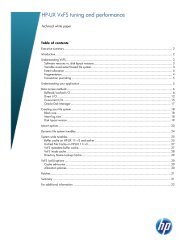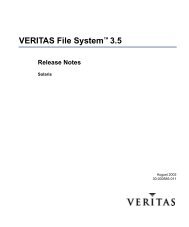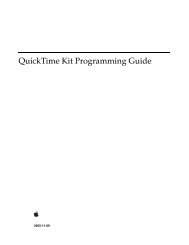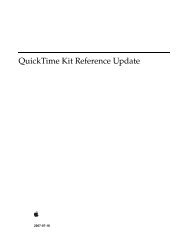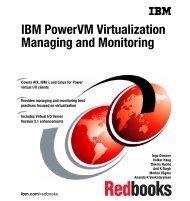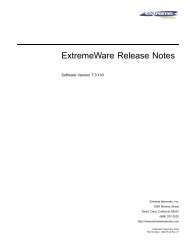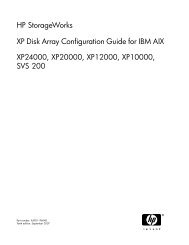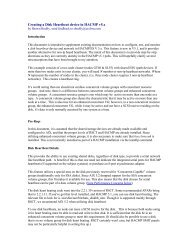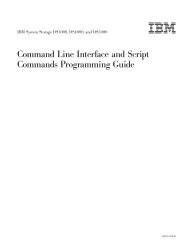- Page 1 and 2:
HP OpenView Operations Administrato
- Page 3:
Intel Itanium Logo: Intel, Intel I
- Page 6 and 7:
Contents 6 About Default Node Group
- Page 8 and 9:
Contents 8 Types of Templates . . .
- Page 10 and 11:
Contents 10 About Character Code Co
- Page 12 and 13:
Contents 11. Tuning and Troubleshoo
- Page 14 and 15:
Contents 14 Enabling and Disabling
- Page 16 and 17:
Contents 16 Maintaining the Managed
- Page 18 and 19:
Contents 18
- Page 21 and 22:
Preface This guide explains HP Open
- Page 23 and 24:
Who Should Read this Guide This gui
- Page 25 and 26:
Conventions The following typograph
- Page 27 and 28:
OVO Documentation Map HP OpenView O
- Page 29 and 30:
Table 2 OVO Manuals (Continued) Man
- Page 31:
OVO Online Information The followin
- Page 34 and 35:
34 ❏ Help Instructions Instructio
- Page 36 and 37:
36 Accessing the Online Help To acc
- Page 38 and 39:
Installing OVO Agents on the Manage
- Page 40 and 41:
Installing OVO Agents on the Manage
- Page 42 and 43:
Installing OVO Agents on the Manage
- Page 44 and 45:
Installing OVO Agents on the Manage
- Page 46 and 47:
Installing OVO Agents on the Manage
- Page 48 and 49:
Installing OVO Agents on the Manage
- Page 50 and 51:
Installing OVO Agents on the Manage
- Page 52 and 53:
Installing OVO Agents on the Manage
- Page 54 and 55:
Installing OVO Agents on the Manage
- Page 56 and 57:
Installing OVO Agents on the Manage
- Page 58 and 59:
Installing OVO Agents on the Manage
- Page 60 and 61:
Installing OVO Agents on the Manage
- Page 62 and 63:
Installing OVO Agents on the Manage
- Page 64 and 65:
Installing OVO Agents on the Manage
- Page 66 and 67:
Installing OVO Agents on the Manage
- Page 68 and 69:
Installing OVO Agents on the Manage
- Page 70 and 71:
Installing OVO Agents on the Manage
- Page 72 and 73:
Installing OVO Agents on the Manage
- Page 74 and 75:
Installing OVO Agents on the Manage
- Page 76 and 77:
Configuring OVO In this Chapter 76
- Page 78 and 79:
Configuring OVO About Preconfigured
- Page 80 and 81:
Configuring OVO About Preconfigured
- Page 82 and 83:
Configuring OVO About Preconfigured
- Page 84 and 85:
Configuring OVO About Preconfigured
- Page 86 and 87:
Configuring OVO About Preconfigured
- Page 88 and 89:
Configuring OVO About Preconfigured
- Page 90 and 91:
Configuring OVO About Preconfigured
- Page 92 and 93:
Configuring OVO About Preconfigured
- Page 94 and 95:
Configuring OVO About Preconfigured
- Page 96 and 97:
Configuring OVO About Preconfigured
- Page 98 and 99:
Configuring OVO About Preconfigured
- Page 100 and 101:
Configuring OVO About Preconfigured
- Page 102 and 103:
Configuring OVO About Preconfigured
- Page 104 and 105:
Configuring OVO About Preconfigured
- Page 106 and 107:
Configuring OVO About Preconfigured
- Page 108 and 109:
Configuring OVO About Preconfigured
- Page 110 and 111:
Configuring OVO About Preconfigured
- Page 112 and 113:
Configuring OVO About Preconfigured
- Page 114 and 115:
Configuring OVO About Preconfigured
- Page 116 and 117:
Configuring OVO About Preconfigured
- Page 118 and 119:
Configuring OVO About Database Repo
- Page 120 and 121:
Configuring OVO About Database Repo
- Page 122 and 123:
Configuring OVO About Database Repo
- Page 124 and 125:
Configuring OVO About Database Repo
- Page 126 and 127:
Configuring OVO Configuring Flexibl
- Page 128 and 129:
Configuring OVO Configuring Flexibl
- Page 130 and 131:
Configuring OVO Configuring Flexibl
- Page 132 and 133:
Configuring OVO Configuring Flexibl
- Page 134 and 135:
Configuring OVO Configuring Flexibl
- Page 136 and 137:
Configuring OVO Configuring Flexibl
- Page 138 and 139:
Configuring OVO Configuring Flexibl
- Page 140 and 141:
Configuring OVO Configuring Flexibl
- Page 142 and 143:
Configuring OVO Configuring Flexibl
- Page 144 and 145:
Configuring OVO Configuring Flexibl
- Page 146 and 147:
Configuring OVO Configuring Flexibl
- Page 148 and 149: Configuring OVO Configuring Flexibl
- Page 150 and 151: Configuring OVO Configuring Flexibl
- Page 152 and 153: Configuring OVO Configuring Flexibl
- Page 154 and 155: Configuring OVO Configuring Flexibl
- Page 156 and 157: Configuring OVO Configuring Flexibl
- Page 158 and 159: Configuring OVO Configuring Flexibl
- Page 160 and 161: Configuring OVO Configuring Flexibl
- Page 162 and 163: Configuring OVO Configuring Flexibl
- Page 164 and 165: Configuring OVO Configuring Flexibl
- Page 166 and 167: Configuring OVO Configuring Flexibl
- Page 168 and 169: Configuring OVO About Variables 168
- Page 170 and 171: Configuring OVO About Variables 170
- Page 172 and 173: Configuring OVO About Variables 172
- Page 174 and 175: Configuring OVO About Variables 174
- Page 176 and 177: Configuring OVO About Variables 176
- Page 178 and 179: Configuring OVO About Variables 178
- Page 180 and 181: Configuring OVO About Variables 180
- Page 182 and 183: Configuring OVO About Variables 182
- Page 184 and 185: Configuring OVO About Variables 184
- Page 186 and 187: Configuring OVO About Variables 186
- Page 188 and 189: Configuring OVO About Variables 188
- Page 190 and 191: Configuring OVO About Variables 190
- Page 192 and 193: Configuring OVO About Variables 192
- Page 194 and 195: Configuring OVO About Variables 194
- Page 196 and 197: Configuring OVO About Variables 196
- Page 200 and 201: Configuring OVO About Variables 200
- Page 202 and 203: Installing and Updating the OVO Con
- Page 204 and 205: Installing and Updating the OVO Con
- Page 206 and 207: Installing and Updating the OVO Con
- Page 208 and 209: Installing and Updating the OVO Con
- Page 210 and 211: Installing and Updating the OVO Con
- Page 212 and 213: Installing and Updating the OVO Con
- Page 214 and 215: Installing and Updating the OVO Con
- Page 216 and 217: Installing and Updating the OVO Con
- Page 218 and 219: Installing and Updating the OVO Con
- Page 220 and 221: HP OpenView Performance Agent In th
- Page 222 and 223: HP OpenView Performance Agent About
- Page 224 and 225: HP OpenView Performance Agent Insta
- Page 226 and 227: HP OpenView Performance Agent Insta
- Page 228 and 229: HP OpenView Performance Agent Insta
- Page 230 and 231: HP OpenView Performance Agent Insta
- Page 232 and 233: HP OpenView Performance Agent Insta
- Page 234 and 235: HP OpenView Performance Agent Preco
- Page 236 and 237: HP OpenView Performance Agent Preco
- Page 238 and 239: HP OpenView Performance Agent Preco
- Page 240 and 241: HP OpenView Performance Agent OVPA
- Page 242 and 243: About OVO Interoperability In this
- Page 244 and 245: About OVO Interoperability Interope
- Page 246 and 247: About OVO Interoperability Interope
- Page 248 and 249:
About OVO Interoperability Interope
- Page 250 and 251:
About OVO Interoperability Interope
- Page 252 and 253:
About OVO Interoperability Interope
- Page 254 and 255:
About OVO Interoperability Interope
- Page 256 and 257:
Integrating Applications into OVO I
- Page 258 and 259:
Integrating Applications into OVO I
- Page 260 and 261:
Integrating Applications into OVO I
- Page 262 and 263:
Integrating Applications into OVO I
- Page 264 and 265:
Integrating Applications into OVO I
- Page 266 and 267:
Integrating Applications into OVO I
- Page 268 and 269:
Integrating Applications into OVO I
- Page 270 and 271:
Integrating Applications into OVO M
- Page 272 and 273:
Integrating Applications into OVO A
- Page 274 and 275:
Integrating Applications into OVO S
- Page 276 and 277:
About Notification Services and Tro
- Page 278 and 279:
About Notification Services and Tro
- Page 280 and 281:
About Notification Services and Tro
- Page 282 and 283:
About Notification Services and Tro
- Page 284 and 285:
About Notification Services and Tro
- Page 286 and 287:
About OVO Language Support In this
- Page 288 and 289:
About OVO Language Support About La
- Page 290 and 291:
About OVO Language Support About La
- Page 292 and 293:
About OVO Language Support About La
- Page 294 and 295:
About OVO Language Support About La
- Page 296 and 297:
About OVO Language Support About La
- Page 298 and 299:
About OVO Language Support About La
- Page 300 and 301:
About OVO Language Support About La
- Page 302 and 303:
About OVO Language Support About La
- Page 304 and 305:
About OVO Language Support About La
- Page 306 and 307:
About OVO Language Support About La
- Page 308 and 309:
About OVO Language Support About La
- Page 310 and 311:
About OVO Language Support About Ch
- Page 312 and 313:
About OVO Language Support About Ch
- Page 314 and 315:
About OVO Language Support About Ch
- Page 316 and 317:
About OVO Language Support About Ch
- Page 318 and 319:
About OVO Language Support About Fl
- Page 320 and 321:
About OVO Language Support Configur
- Page 322 and 323:
About OVO Language Support Configur
- Page 324 and 325:
About OVO Language Support Troubles
- Page 326 and 327:
About OVO Language Support Localizi
- Page 328 and 329:
About the OVO Java-based Operator G
- Page 330 and 331:
About the OVO Java-based Operator G
- Page 332 and 333:
About the OVO Java-based Operator G
- Page 334 and 335:
About the OVO Java-based Operator G
- Page 336 and 337:
About the OVO Java-based Operator G
- Page 338 and 339:
About the OVO Java-based Operator G
- Page 340 and 341:
About the OVO Java-based Operator G
- Page 342 and 343:
About the OVO Java-based Operator G
- Page 344 and 345:
About the OVO Java-based Operator G
- Page 346 and 347:
About the OVO Java-based Operator G
- Page 348 and 349:
About the OVO Java-based Operator G
- Page 350 and 351:
About the OVO Java-based Operator G
- Page 352 and 353:
About the OVO Java-based Operator G
- Page 354 and 355:
About the OVO Java-based Operator G
- Page 356 and 357:
About the OVO Java-based Operator G
- Page 358 and 359:
About the OVO Java-based Operator G
- Page 360 and 361:
About the OVO Java-based Operator G
- Page 362 and 363:
About the OVO Java-based Operator G
- Page 364 and 365:
About the OVO Java-based Operator G
- Page 366 and 367:
About the OVO Java-based Operator G
- Page 368 and 369:
About the OVO Java-based Operator G
- Page 370 and 371:
About the OVO Java-based Operator G
- Page 372 and 373:
About OVO Processes In this Chapter
- Page 374 and 375:
About OVO Processes About Communica
- Page 376 and 377:
About OVO Processes About Managemen
- Page 378 and 379:
About OVO Processes About Managemen
- Page 380 and 381:
About OVO Processes About Managemen
- Page 382 and 383:
About OVO Processes About Managed N
- Page 384 and 385:
About OVO Processes About Managed N
- Page 386 and 387:
About OVO Processes About Managed N
- Page 388 and 389:
About OVO Processes About Managed N
- Page 390 and 391:
About OVO Processes About Process S
- Page 392 and 393:
About OVO Processes About Process S
- Page 394 and 395:
Tuning and Troubleshooting OVO In t
- Page 396 and 397:
Tuning and Troubleshooting OVO Tuni
- Page 398 and 399:
Tuning and Troubleshooting OVO Tuni
- Page 400 and 401:
Tuning and Troubleshooting OVO Tuni
- Page 402 and 403:
Tuning and Troubleshooting OVO Trou
- Page 404 and 405:
Tuning and Troubleshooting OVO Trou
- Page 406 and 407:
Tuning and Troubleshooting OVO Trou
- Page 408 and 409:
Tuning and Troubleshooting OVO Trou
- Page 410 and 411:
Tuning and Troubleshooting OVO Trou
- Page 412 and 413:
Tuning and Troubleshooting OVO Trou
- Page 414 and 415:
Tuning and Troubleshooting OVO Solv
- Page 416 and 417:
Tuning and Troubleshooting OVO Solv
- Page 418 and 419:
Tuning and Troubleshooting OVO Solv
- Page 420 and 421:
Tuning and Troubleshooting OVO Solv
- Page 422 and 423:
Tuning and Troubleshooting OVO Solv
- Page 424 and 425:
Tuning and Troubleshooting OVO Solv
- Page 426 and 427:
Tuning and Troubleshooting OVO Solv
- Page 428 and 429:
Tuning and Troubleshooting OVO Solv
- Page 430 and 431:
Tuning and Troubleshooting OVO Solv
- Page 432 and 433:
Tuning and Troubleshooting OVO Solv
- Page 434 and 435:
Tuning and Troubleshooting OVO Solv
- Page 436 and 437:
Tuning and Troubleshooting OVO Solv
- Page 438 and 439:
Tuning and Troubleshooting OVO Solv
- Page 440 and 441:
Tuning and Troubleshooting OVO Solv
- Page 442 and 443:
Tuning and Troubleshooting OVO Solv
- Page 444 and 445:
Tuning and Troubleshooting OVO Solv
- Page 446 and 447:
Tuning and Troubleshooting OVO Solv
- Page 448 and 449:
Tuning and Troubleshooting OVO Solv
- Page 450 and 451:
Tuning and Troubleshooting OVO Solv
- Page 452 and 453:
Tuning and Troubleshooting OVO Solv
- Page 454 and 455:
Tuning and Troubleshooting OVO Solv
- Page 456 and 457:
Tuning and Troubleshooting OVO Solv
- Page 458 and 459:
Tuning and Troubleshooting OVO Solv
- Page 460 and 461:
Tuning and Troubleshooting OVO Solv
- Page 462 and 463:
Tuning and Troubleshooting OVO Solv
- Page 464 and 465:
Tuning and Troubleshooting OVO Acce
- Page 466 and 467:
Tuning and Troubleshooting OVO Solv
- Page 468 and 469:
Tuning and Troubleshooting OVO Solv
- Page 470 and 471:
Tuning and Troubleshooting OVO Solv
- Page 472 and 473:
Tuning and Troubleshooting OVO Solv
- Page 474 and 475:
Tuning and Troubleshooting OVO Solv
- Page 476 and 477:
Tuning and Troubleshooting OVO Solv
- Page 478 and 479:
About OVO Security In this Chapter
- Page 480 and 481:
About OVO Security About System Sec
- Page 482 and 483:
About OVO Security About Network Se
- Page 484 and 485:
About OVO Security About Network Se
- Page 486 and 487:
About OVO Security About Network Se
- Page 488 and 489:
About OVO Security About Network Se
- Page 490 and 491:
About OVO Security About Network Se
- Page 492 and 493:
About OVO Security About Network Se
- Page 494 and 495:
About OVO Security About Security i
- Page 496 and 497:
About OVO Security About Security i
- Page 498 and 499:
About OVO Security About Security i
- Page 500 and 501:
About OVO Security About Security i
- Page 502 and 503:
About OVO Security About Security i
- Page 504 and 505:
About OVO Security About Security i
- Page 506 and 507:
About OVO Security About Security i
- Page 508 and 509:
About OVO Security About Security i
- Page 510 and 511:
About OVO Security About Security i
- Page 512 and 513:
About OVO Security About Security i
- Page 514 and 515:
About OVO Security About Security i
- Page 516 and 517:
About OVO Security About Security i
- Page 518 and 519:
About OVO Security Creating the OVO
- Page 520 and 521:
Maintaining OVO In this Chapter 520
- Page 522 and 523:
Maintaining OVO Downloading Configu
- Page 524 and 525:
Maintaining OVO Backing up Data on
- Page 526 and 527:
Maintaining OVO Backing up Data on
- Page 528 and 529:
Maintaining OVO Backing up Data on
- Page 530 and 531:
Maintaining OVO Backing up Data on
- Page 532 and 533:
Maintaining OVO Backing up Data on
- Page 534 and 535:
Maintaining OVO Backing up Data on
- Page 536 and 537:
Maintaining OVO Backing up Data on
- Page 538 and 539:
Maintaining OVO Configuring a Datab
- Page 540 and 541:
Maintaining OVO Maintaining the HP
- Page 542 and 543:
Maintaining OVO Maintaining OVO Dir
- Page 544 and 545:
Maintaining OVO Maintaining the Man
- Page 546 and 547:
Maintaining OVO Maintaining the Man
- Page 548 and 549:
Maintaining OVO Maintaining License
- Page 550 and 551:
Maintaining OVO Maintaining License
- Page 552 and 553:
Maintaining OVO Changing Hostnames
- Page 554 and 555:
Maintaining OVO Changing Hostnames
- Page 556 and 557:
Maintaining OVO Changing Hostnames
- Page 558 and 559:
Maintaining OVO Changing Hostnames
- Page 560 and 561:
Maintaining OVO Changing Hostnames
- Page 562 and 563:
Maintaining OVO Changing Hostnames
- Page 564 and 565:
Maintaining OVO Changing Hostnames
- Page 566 and 567:
Maintaining OVO Changing Hostnames
- Page 568 and 569:
Maintaining OVO Changing Hostnames
- Page 570 and 571:
Maintaining OVO Changing Hostnames
- Page 572 and 573:
Maintaining OVO Changing Hostnames
- Page 574 and 575:
Maintaining OVO Changing Hostnames
- Page 576 and 577:
Maintaining OVO Changing Hostnames
- Page 578 and 579:
Maintaining OVO Changing Hostnames
- Page 580 and 581:
Administration of the OVO Managemen
- Page 582 and 583:
Administration of the OVO Managemen
- Page 584 and 585:
Administration of the OVO Managemen
- Page 586 and 587:
Administration of the OVO Managemen
- Page 588 and 589:
Administration of the OVO Managemen
- Page 590 and 591:
Administration of the OVO Managemen
- Page 592 and 593:
Administration of the OVO Managemen
- Page 594 and 595:
Administration of the OVO Managemen
- Page 596 and 597:
Administration of the OVO Managemen
- Page 598 and 599:
About OVO Managed Node APIs and Lib
- Page 600 and 601:
About OVO Managed Node APIs and Lib
- Page 602 and 603:
About OVO Tables and Tablespaces in
- Page 604 and 605:
About OVO Tables and Tablespaces in
- Page 606 and 607:
About OVO Tables and Tablespaces in
- Page 608 and 609:
About OVO Tables and Tablespaces in
- Page 610 and 611:
About OVO Tables and Tablespaces in
- Page 612 and 613:
About OVO Man Pages In this Appendi
- Page 614 and 615:
About OVO Man Pages Man Pages in OV
- Page 616 and 617:
About OVO Man Pages Man Pages in OV
- Page 618 and 619:
About OVO Man Pages Man Pages for O
- Page 620 and 621:
About OVO Man Pages Man Pages for H
- Page 622 and 623:
All Pending Details Report, 123 All
- Page 624 and 625:
Cluster administration overview, 57
- Page 626 and 627:
facilities, 72 de-installing See al
- Page 628 and 629:
control, 538 converting managed nod
- Page 630 and 631:
ice_proxy_address option itooprc, 3
- Page 632 and 633:
overview, 296-309 setting character
- Page 634 and 635:
overview, 287-295 setting character
- Page 636 and 637:
emotely, 343-344 configuring access
- Page 638 and 639:
opcseldist utility, 214 opctmpldwn,
- Page 640 and 641:
overview, 219-240 software requirem
- Page 642 and 643:
See also recovering redistributing
- Page 644 and 645:
user profiles, 274 severity message
- Page 646 and 647:
tools backup, 524 controller, 347-3
- Page 648:
string, 144 648



